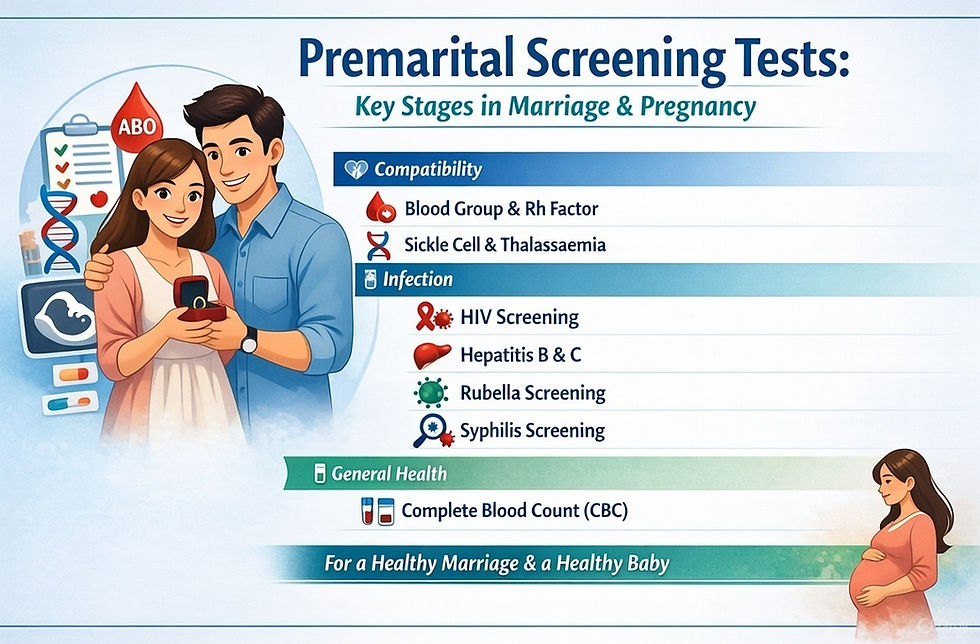Understanding the Difference Between Blood Group and Haemoglobin Genotype
- EJB
- Dec 4, 2024
- 3 min read
Introduction

When discussing human health and genetics, two terms often come up: Blood Group and Haemoglobin Genotype. While both are fundamental aspects of our biological makeup, they serve different functions and have distinct implications for health and genetics. Here, we delve into what each term means, how they differ, and why understanding these differences is crucial.
What is a Blood Group?

Definition: Blood group, or blood type, refers to the classification of blood based on the presence or absence of certain antigens on the surface of red blood cells. The most widely recognized system is the ABO blood group system, followed by the Rh system.
Key Points:
ABO System:
A blood group has antigens A.
B blood group has antigens B.
AB has both A and B antigens.
O has neither A nor B antigens.
Rh System:
Rh Positive (Rh+) individuals have Rh antigens.
Rh Negative (Rh-) individuals do not have Rh antigens.
Importance:
Critical for blood transfusions to avoid transfusion reactions.
Influences organ transplantation compatibility.
Can affect pregnancy if the mother is Rh- and the foetus Rh+.
What is Haemoglobin Genotype?

Definition: Haemoglobin genotype refers to the genetic makeup that determines the type of haemoglobin an individual produces. Haemoglobin is crucial for oxygen transport in the blood. The most common genotypes relate to the presence of normal haemoglobin (HbA) or variants like HbS (sickle cell haemoglobin).
Key Points:
AA: Normal haemoglobin, no sickle cell trait or disease.
AS: Sickle cell trait, one normal gene, one sickle cell gene.
SS: Sickle cell disease, both genes are for sickle haemoglobin.
Sβ+ (or Sβ0): Sickle cell & beta-thalassemia
SC,SD, SE, SO: Sickle cell and other abnormal haemoglobins HbC, HbD, HbE or HbO
CC: Homozygous HbC disease
Importance:
Determines the risk of sickle cell disease, a condition where red blood cells can distort into a sickle shape, leading to severe health issues.
Affects how one should manage health, especially in areas prevalent with malaria, as the sickle cell trait can offer some resistance against malaria.
Key Differences:
Function:
Blood Group: Involved in blood compatibility for transfusions and other medical procedures.
Haemoglobin Genotype: Defines the type of hemoglobin, impacting oxygen carrying capacity and related health conditions.
Genetics:
Blood Group: Determined by multiple alleles at one gene locus for ABO and another for Rh factor.
Haemoglobin Genotype: Inherited from both parents, specifically related to the beta-globin gene.
Health Implications:
Blood Group: Mainly affects medical procedures like transfusions but can have minor health implications like increased risk of certain diseases linked to specific blood types.
Haemoglobin Genotype: Directly impacts the individual's health, especially in terms of sickle cell conditions, and has implications for carrier status and disease management.
Testing:
Blood Group: Can be tested through blood typing, where specific antibodies are used to detect antigens on red blood cells.
Haemoglobin Genotype: Usually involves more complex tests like High Performance Liquid Chromatography (haemoglobin electrophoresis) or genetic testing.
Why You Should Know the Difference
Understanding these differences is not just for medical professionals but is also beneficial for individuals:
Blood Donation and Receiving: Knowing your blood type can make you a potential lifesaver through blood donation, and it's crucial for safe blood transfusions.
Family Planning: Knowledge of hemoglobin genotypes can influence decisions about family planning, especially in regions where sickle cell disease is common.
Health Management: If you carry sickle cell traits, understanding your genotype can lead to better health management strategies.
Conclusion
While blood group and haemoglobin genotype both deal with aspects of blood, they are distinct. Blood group involves how your blood interacts with others' blood, crucial for medical procedures, whereas haemoglobin genotype deals with the quality of your blood's oxygen transport system, directly influencing your health. Both are inherited, but their implications on health and medical practice vary significantly. Awareness of these concepts can lead to better health decisions, especially in contexts involving blood transfusions, genetic counselling, or managing genetic conditions.




Comments